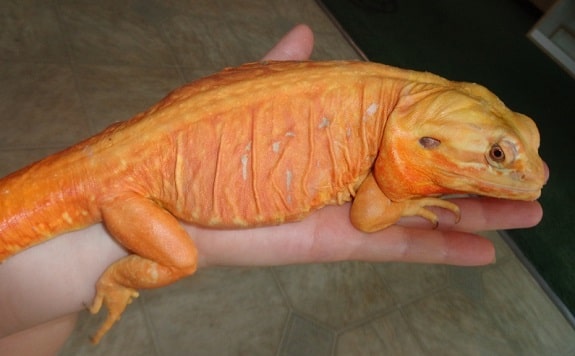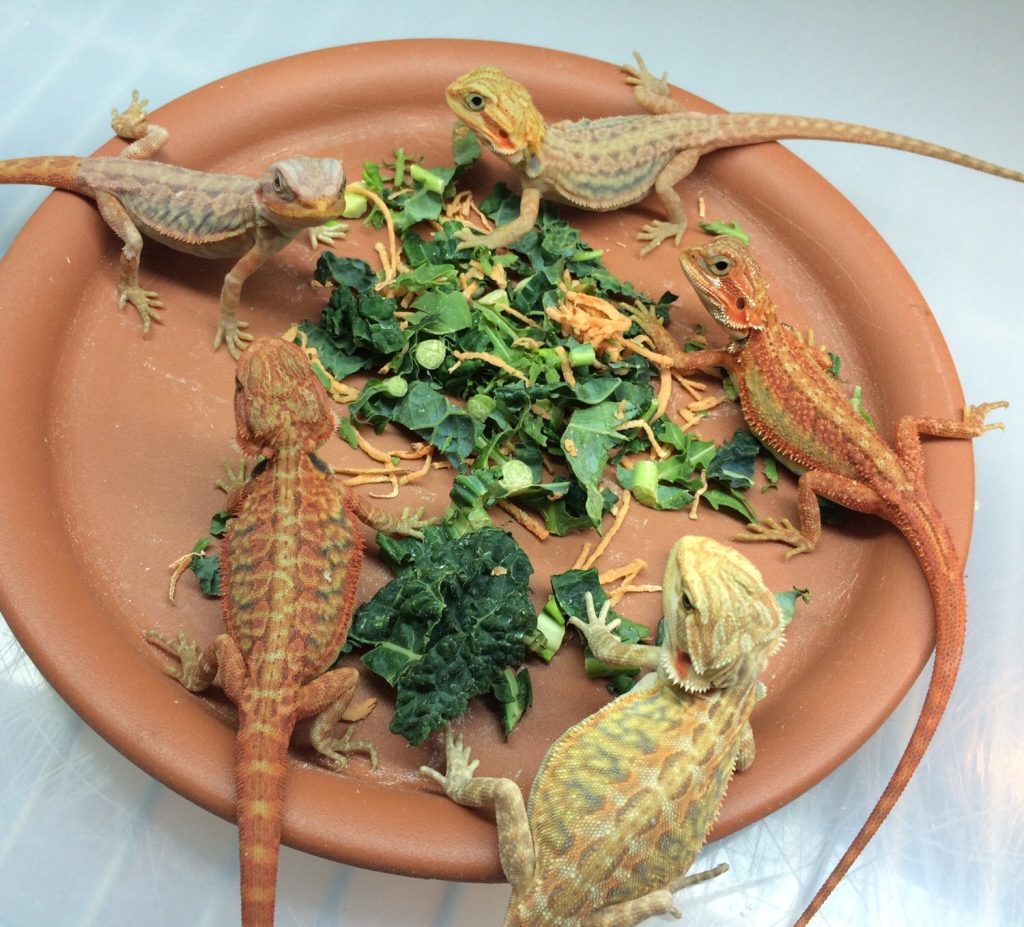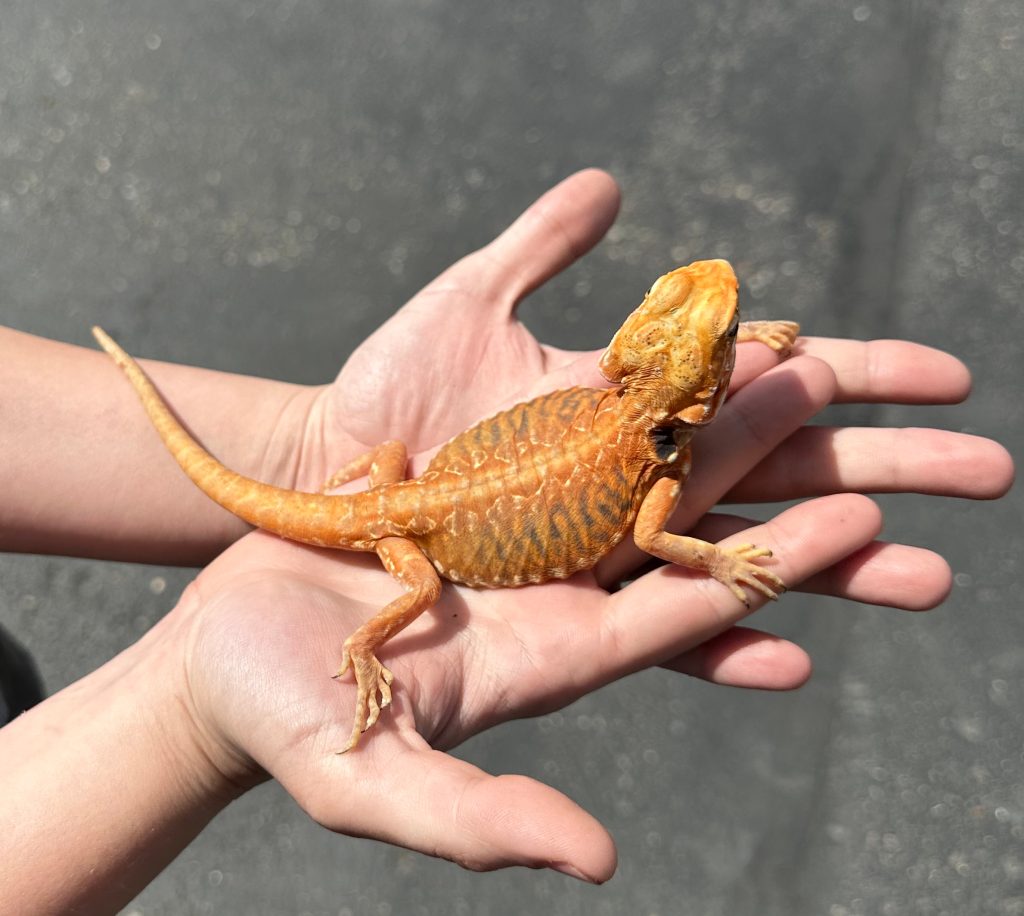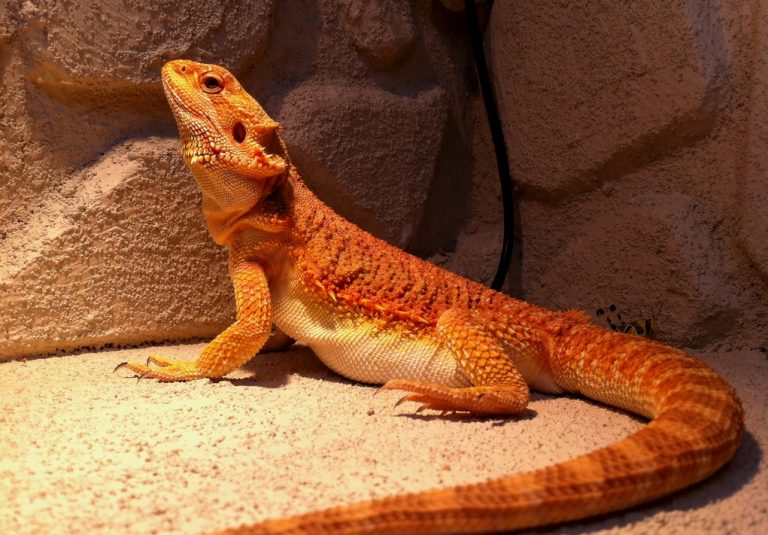Your silkback bearded dragon needs more care than a bearded dragon. After all, their skin is exposed to the external environment due to the lack of scales.
It can create difficulties for them in multiple factors. Hence, you need to give them special care due to the health issues.
So, how to care for silkback bearded dragons? You have to keep your silkback bearded dragon hydrated, keep them in low levels of UVB light, give baths during the shedding process, provide them with required nutrition, apply aloe vera on the body, etc.
However, in this article, I will give you the silkback bearded dragon care guide, the diet of silkback bearded dragons, their health issues, enclosure, and many more. Please keep on reading!
How to Care for Silkback Bearded Dragon?

You have to give extra attention to your silkback bearded dragon. This reptile is now more prone to injuries due to the skin condition. Hence, taking proper care of the silkback dragon is much needed.
But how can you take care of your silkback bearded dragon? The points I have written below will help you to take proper care of the reptile. So, please check it out here-
Hydration
You need to give your silkback bearded dragon a lot of water. As they have less to no scales on their skin, fluid loss can impact them more badly.
It also makes the skin coloration look vivid. However, you may not know what fluid loss is. Fluid loss happens to every living being through sweat, pee, tears, etc. So, they are always in need of more fluid.
Hence, you must take care that they are hydrated. You may provide them with the water via misting. Whatever medium you choose, as long as it is comfortable for them, it is fine.
Mating
During the breeding period, a male bearded dragon often bites the neck of a silkback female bearded dragon. As silkback bearded dragons have no scales, the bite can badly injure the breeding silkback bearded dragon.
It can also cause them unbearable pain. A study shows that a silkback female bearded dragon can also get infections from the bites. The infection can be life-threatening to the female silkback dragon. Therefore, avoid using female breeder for mating programs.
Please note that you need to consult a vet in case you have already used a male bearded dragon and a female Silkback bearded dragon for a breeding program. It will ensure that they are safe from infections.
Bath
Silkback bearded dragons tend to shed more often than regular bearded dragons. Shedding is quite difficult for a Silkback bearded dragon.
Without scales, they cannot shed properly. Sometimes, their skin stays trapped and doesn’t fall away easily. That’s why during the shedding period of silkback bearded dragons, you should give them a bath.
It will also prevent the silkback beardie from constriction.
You can use a formula with the bath water. ZILLA Shed-Ease is a good formula made with aloe vera and other moisturizers. It can greatly help your silkback bearded dragon in shedding.
Many people also keep high dampness in their enclosures to make them comfortable during shedding.
Diet
You need to take care of the diet of Silkback bearded dragons. Their diet is not much different from the standard bearded dragon. Especially, getting a proper diet helps them in their shedding process.
You can give them vegetables, worms, and fruits in their diet. It will provide them with all nutrition they require in their body.
Lighting
A Silkback bearded dragon cannot bear the density of UV light. As they lack the scales, their skin is sensitive to lighting. So you should definitely keep them in low rays of UVB light. Some owners usually keep them in the full volume of UVB lights.
But it is not wise to do so. Instead, it is always recommended to keep them in a shadowy area. It will not irritate their skin. Additionally, it is important to keep them comfortable in their enclosure.
Aloe Vera
You can apply Aloe Vera to the Silkback bearded dragon’s skin. It will keep their skin moisturize and healthy. But you have to make sure that you are not using any other moisturizers with the Aloe Vera. You can also use other lotions to keep smooth skin.
It should be completely pure. You can get it at any grocery store. After buying, gently apply the Aloe vera to the entire skin of the Silkback bearded dragon.
How the Silkback Bearded Dragons Do Mutation?
The Silkbacks are a species that came from a genetic mutation. They are a kind of morph that is a bit different from other normal bearded dragon species.
They are born without scales. In simple terms, their gene DNA sequence is different from the other gene DNA sequence.
These silkback bearded dragons do not have many scales genetically. Now, their gene have spread more. So, you can find a lot of silkback bearded dragons in the wild.
Their skin appears different than regular bearded dragons. They have quite an unusual appearance. When you look at a normal bearded dragon, you will see its skin is fully covered with scales. It gives them protection from any kind of injury.
But in the case of Silkback bearded dragons, they get no protection. Basically, their skin is a result of genetic mutation. Apart from this, there are no significant causes found behind their skin condition.
Diet of Silkback Bearded Dragon

The diet of Silkback bearded dragons should be filled with nutrition, vegetables, fruits, etc. Here is a broad description of the diet that will help them to stay healthy:
Nutrition vegetables
You should provide green foods to your leatherback bearded dragons. Collard greens, mustard greens, and bell pepper could be nutritious foods you can add to their diet.
But many reptile keeper do not provide mixed diets to their beardies. You should mix vegetables with greens to give them the required vitamins and minerals in their body.
Worms
You can provide them with mealworms, crickets, super worm, or black soldier larvae in the diet. These insects are highly nutritious for them.
Fruits
You can occasionally provide them with fruits. But it should be of moderate level. Fruits such as Berries, Apples, or Mangoes are good for them. Provide these fruits to them as a treat.
Calcium
Silkback bearded dragons require a lot of calcium. You can provide them with calcium supplements 2-3 times a week. it will keep them healthy.
Is It Okay for Beginners to Pet Silkback Bearded Dragon?

As a beginner, it is not okay for beginners to pet silkback bearded dragons. There are a number of reasons why you should not pet a silkback dragon.
A beginner owner will have to face a lot of challenges at the starting point. They have to keep the pet properly hydrated and protected from injuries.
As these silkies require specialized care and attention, a simple tiny mistake in petting them can bring out a lot of problems for them. At the worst, you will put their life at risk. I am sure that you do not want this to happen.
So, you can start out with a normal bearded dragon. They also need proper care but it is much easier for you to handle the normal ones than leatherbacks.
Therefore, you should consider buying them first. Later, you can have leatherbacks too once you are good to handle them.
Silkback Bearded Dragon Health Issues
Due to a lack of scales, a silkback bearded dragon has to struggle a lot with its health. If they are not taken care of correctly, harmful infections can put their life at risk. Therefore, you should be aware of their health issues.
This will make it easier for you to take care of them. Have a look below to know the types of issues they face:
Skin
Their skin is more likely to get affected by infections due to the absence of scales. They may suffer from severe lacerations. That’s why moisturizing their skin from time to time is needed.
Sun
Compared to a normal bearded dragon, its skin is more prone to light. You should be careful about the exposure to UVB lighting. It will keep them safe from UV rays.
Body temperature
It is difficult for silkback bearded dragons to regulate their body effectively. Providing them with a proper heat gradient is required to regulate body temperature.
Injuries
The silkback bearded dragons tend to bruise their skin very easily. So, if you keep them in an unsuitable enclosure, anything with sharp edges can damage their skin.
Scaleless bearded dragons don’t have scales for protection of their skin like normal bearded dragons have. So, the injuries will cause your pet a lot of pain.
So you need to be careful about their special care requirements. Providing them with a suitable enclosure is needed. It will ensure your silkback bearded dragon is safe.
Silkback Dragons Enclosure Setup

The silkback bearded dragon’s enclosure should be designed in a suitable way for them. Otherwise, your silkback dragon can injure their skin and face problems inside the enclosure. So, here are some tips to design their enclosure perfectly-
Size
A silkback bearded dragon should have the perfect size enclosure. As they are quite active reptiles, they need enough space to move. Giving an adult silkback dragon enclosure of 15-20 inches in size is enough. The minimum tank size should be 4*2*2 feet.
Temperature
You should place the temperature gradient around 75 to 90 degrees. The basking area should be 95 to 105 degrees. Within this temperature, your silkback dragon can properly regulate its body temperature.
Humidity
You should provide them with a suitable humidity level in their enclosure. The humidity level in the enclosure should be 40%-60%. It will keep their skin safe from the high humidity.
Water and diet
Provide them with enough water in their enclosure so they can keep themselves hydrated. Also, include nutritious vegetables and fruits in their enclosure. It will keep their skin healthy and hydrated.
Do Silkback Bearded Dragons Like To Be Pet?
Yes. Silkback dragons like to be pets. They enjoy being handled by the owner. They also feel comfortable with the owner. More likely, if the owner can give them a head-to-tail tender scratch, they love it.
But in some cases, a few silkback bearded dragons may not be like being a pet. It completely depends on their preferences. But most likely, they won’t give you any trouble while petting them.
However, you should be careful when you pet your silkback bearded dragon. If you do it aggressively, you might hurt their skin.
And you don’t want to do that as they have very sensitive skin due to the lack of scales. Hence, you need to be very cautious while handling them.
Conclusion
A silkback bearded dragon has to suffer a lot if they are not properly taken care of. It is because their skin gets sensitive and exposed to infections and many other risks.
Moreover, they get physically affected by this condition. It makes them become dehydrated frequently.
But this condition can be minimized if the owners know how to care for them, In addition, you must keep them hydrated, provide them with a good diet, and keep applying lotions and moisturizers regularly.
However, I hope this article helped you with the complete information about Silkback bearded dragon.
FAQs
How Long A Silkback Bearded Dragon Lives?
A Silkback bearded dragon lives around 12 years. They have a similar lifespan same as the normal bearded dragon. But you need to take proper care of the Silkback bearded dragon if you want them to have a long lifespan.
How Often Should I Bath A Silkback Bearded Dragon?
As the Silkie bearded dragon stays dehydrated, you need to give them frequent baths. They need more baths than a normal bearded dragon for their skin condition. Hence, you should give them a bath 2-3 times a week.
What Humidity Level Is Good For A Silkback Bearded Dragon?
A Silkback bearded dragon needs higher humidity levels than a normal bearded dragon. Their humidity levels in the enclosure should be around 50%.



